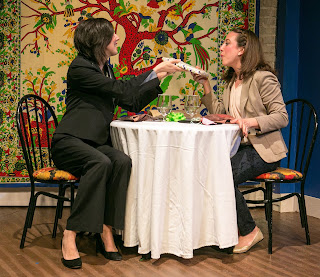Handling the moral balance of payments: Complications of the attempt are probed in Phoenix Theatre's "The Open Hand"
 |
| College roommates Freya and Allison, now upwardly mobile urbanites, bond over lunch. |
Contemporary urban life in Robert Caisley's play is predicated upon self-interest and the expectation that all generosity must be reciprocated. Allison (Leah Brenner), the beneficiary of the stranger's paying it forward, is obsessed by that need. Disguising his good deed from her husband Jack (Jay Hemphill), whose professional culinary ambitions are all-consuming, is a mistake destined to be compounded. In gratitude, the good stranger, the solidly named David Nathan Bright (Charles Goad), must be invited to an intimate two-couple get-together that no one is allowed to call Allison's birthday celebration. This could be the creepiest birthday party since Harold Pinter, the playgoer might be entitled to think.
Happiness must be doled out in Allison's world, and what produces it must be measured and entered into the moral ledger. Her calculations infect her best friend, Freya, as well as Jack, and the pressure to weigh all life's moves accurately brings Freya's Todd, a car salesman, to the breaking point. Balances must be struck and calibrations checked. Caisley has set up an anxious display of the commodification of thoughts and acts, particularly between intimates. It's a process that's wound ever tighter until the market collapses, with shattering effect. In the worldview Allison sustains, with buy-in among all four, acts of generosity, never free and unattached, are assigned an exchange-value. Karl Marx would have understood.
The Phoenix Theatre production opened over the weekend; after attending the Sunday matinee, I felt as if I'd been to church again — but this time had snatched a few bills from the collection plate, then tried to return them without detection, felt gratitude about not being noticed (combined with guilt), then added a few more dollars before wondering how much would amount to overcompensation. Is this any way to live? Do we have any choice? "The Open Hand" may leave you wondering if your gratitude has been conditional all along, if your basic selfishness has been evident to everyone you know, if charitable acts are bound to be misunderstood unless the motive and the back-story are transparent. That's ironic, about which more below.
Dale McFadden directs the cast with his usual, fine-textured attention to detail. Nothing seems to happen or be said that is not in some sense the expression of every character onstage. This is true especially in the early scenes, when the playwright appears to be taking delight in having the audience share in the mystification that besets the characters. Sometimes, just when we think we are most focused, we are most susceptible to distraction.
Only David Nathan Bright is self-possessed. In the steady openhandedness of Goad's portrayal, he carries the aura of a visitor from beyond. McFadden has the other actors picking up adroitly on the brittle nature of intimacy, which always wants to know more, because knowledge seems so much better than faith. But only ignorance enables faith to become stronger, as Montaigne said long ago; what we know for sure is forever dependent on testing it against what we don't.
 |
| Awaiting a late arrival, the host couple and Freya get to know a mysterious benefactor. |
Freya's faith in her friendship with Allison is already under strain, to which is added her being on tenterhooks about snagging a high-end international wine job. Well, there's also some difficulties in her marriage, all of which Mauro conveys as being under quite tenuous control. The bluffly macho Todd (Jeremy Fisher) sells luxury cars, but his job insecurity under a toxic boss will have an explosive effect in the climactic party scene.
 |
| Todd meets David Nathan Bright in the worst way. |
"The Open Hand" is finally a comedy, though the laughs come early and somewhat under shadows. But it takes a place in the prevailing Judeo-Christian mode of irony, which Western culture has inherited in uneasy partnership with the Greek mode of tragedy. The ironic mode has made our stage comedies richer, and it has given us a more capacious understanding of life's sadness. Despite Shakespeare, the tragic view of life sits uneasily with us, leading to the frequent misinterpretation of "Hamlet" as a portrait of indecisiveness.
Though there's nothing explicitly religious about "The Open Hand," it rests on the foundational irony of Christianity derived from Jewish religion. Our expectations are thwarted; what we do and what happens to us is an endless struggle between our faith and our knowledge. Attempts to resolve that conflict through striking out on new paths sometimes dazzle us beyond anything we may have anticipated, as for Ruth in the Bible, whose famous decision is crucially referenced in this play's final scene. We can't be sure of success, because the accumulation of discouragements compels us to ask, with Job, the ironic question: "Why is light given to a man whose way is hid, and whom God hath hedged in?"
"The Open Hand" provides an extraordinarily moving answer to this question. Furthermore, the production is a technical marvel, with several evocative sets (Jeffery Martin) constructed on a turntable, furnished (and its actors outfitted, by Emily McGee) with just enough signs of material striving and accomplishment to reinforce the play's context of interplay between the open hand and its all-too-frequently closed opposite, between the lighted way and the one hidden or hedged in.
[Photos by Joe Konz]



Comments
Post a Comment